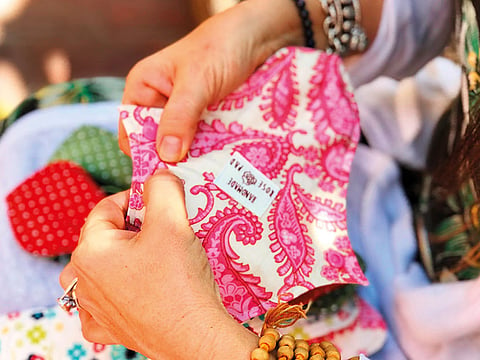Are reusable sanitary pads the way forward?
Eco-warriors pitch for sustainable option ahead of Menstrual Hygiene Day

DUBAI: Ahead of World Menstrual Hygiene Day on May 28, two Dubai residents are encouraging women to adopt reusable sanitary napkins.
Briton Vanessa Woodthorpe-Wright and Aussie Maria Peters claim the eco-friendly alternatives are not just easy on the wallet but also safer.
“Disposable napkins take anywhere between 500 and 700 years to decompose. Imagine the damage they cause to the environment considering an average women uses around 17,000 of them during her lifetime,” said Woodthrope-Wright whose company Woman Space pioneered cloth-based pads called Rosepads in the UAE a few years ago.
Preconceived notion
“Most women are reluctant to switch to washable pads because they have grown up with disposable pads and believe that menstrual blood is bad. This is an ill-conceived notion,” said Woodthrope Wright, who started using reusable pads after being diagnosed with endometriosis.
“The doctors suggested a hysterectomy, but I decided to fight the painful disorder by making lifestyle changes. The first thing I changed was my menstrual pads.
"I made some colourful cotton pads for myself and started using them during my periods. Within days I was feeling better. Soon word spread about my washable pads and I started getting enquiries from friends and acquaintances,” she recalled.
Cost effective
Priced between Dh35 and Dh65, the Rose Pads are available online and at stores like Just Be and Greenheart UAE in Dubai. “They could last for up to a year so they are cost-effective too,” said Woodthrope-Wright.
Marita Peters, executive director of Dubai-based environment company Surge Middle East said menstrual hygiene is among the most challenging development issues in the world today.
According to a Unicef study, one in 10 African girls miss school during their periods as they have no safe or private place to change their menstrual materials.
In India, a report by Plan India and AC Nielsen revealed that 88 per cent of women use old fabric, rags or sand to manage their flow, because they cannot access or afford commercial sanitary pads.
Marita Peters said they have launched a programme in third world countries to help women overcome taboos about menstruation.
“Among the many things we teach them is to make reusable pads. Over 3,000 women in Uganda, Haiti and Philippines have benefitted from the programme so far,” she said.



